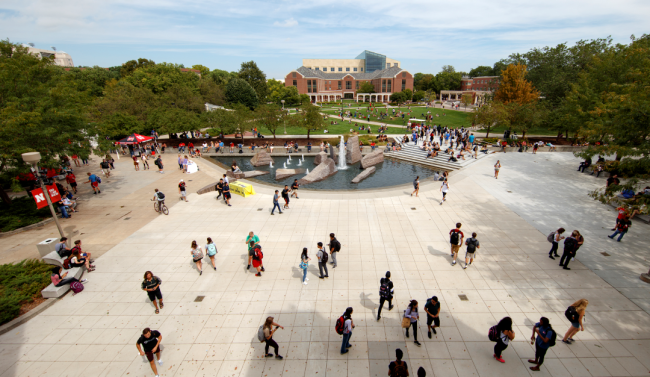You have /5 articles left.
Sign up for a free account or log in.

Incoming first-year students at the University of Nebraska at Lincoln participate in an inclusive excellence event each fall to learn about diversity and communication.
University of Nebraska at Lincoln
Every fall, 3,000 or so new students at the University of Nebraska at Lincoln gather together to learn about community, inclusivity and building communication skills during the Husker Dialogues event.
The event, supported by around 300 volunteer students, staff and faculty members, offers an opportunity for the university to get ahead of interpersonal conflict and build a more respectful campus community, explains Charlie Foster, special assistant to the vice chancellor for Diversity and Inclusion.
What’s the need: The university launched the program in 2016, recognizing the needs first-year students have when coming to college.
“Coming to college is different [from high school]—you’re seeking to find yourself and relationships with others,” Foster says.
Husker Dialogues, in turn, offers a way for students to reach out and connect with their peers. And when problems—from passive-aggressive roommates or more deeply rooted issues like bigotry—arise, students are more prepared.
When creating Husker Dialogues, personnel from academic affairs and student affairs rallied together to build programming for students to “learn better, to be better, to stop and think about the stories of people they’ve never met,” Foster says.
Staff and faculty across campus contribute to programming, marketing and logistics, plus lead small group sessions between students—one way to unite student success work across silos, Foster says. Planning typically begins in January for a fall event.
How it works: On the big day, a variety of student leaders from different clubs and organizations on campus and university administrators gather to share personal stories about leadership and resilience, Foster says. This fall, the student government president and the chancellor will both serve as speakers.
After the speakers finish, students break off into randomized groups of 10, facilitated by a conversation guide. University leaders have found first-year students are comfortable with conversation guides who are fellow students and strive to recruit student leaders to participate, Foster says.
To serve as a conversation guide, campus community members complete a 90-minute training that teaches them skills like identifying a microaggression and how to build productive conversation between group members.
In their small groups, students participate in icebreakers and then respond to discussion questions about the speakers such as identifying what resonated with them or how they were challenged in their personal leadership style.
The impact: UNL collects survey data from its conversation guides and student participants. In general, students who participate are pleased with the impact of the event and want to contribute to more inclusion efforts on campus. Some small groups remain connected throughout the year, as well.
The program has spread beyond undergraduate first-years and into graduate student programs, into the classroom and even as a professional development tool among faculty and staff members.
Husker Dialogues also inspired Kansas State University’s “Wildcat Dialogues,” a student-led initiative impacting around 750 to 800 students each year.
Seeking stories from campus leaders, faculty members and staff for our Student Success focus. Share here.
This article has been updated to correct Charlie Foster's title at UNL.




